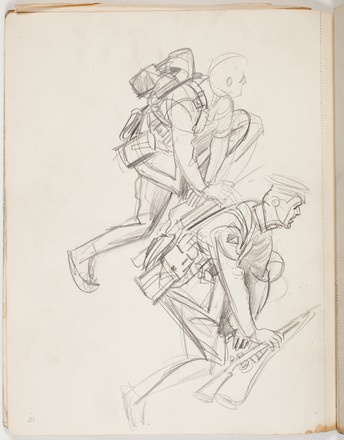
Sketchbook with horse and figure studies
1918–19
Pencil, ink and charcoal drawings on paper
Bequest of Sir William Dixson, 1952
DL PX 71
Pencil, ink and charcoal drawings on paper
Bequest of Sir William Dixson, 1952
DL PX 71
Late in 1917 the Australian High Commission in London appointed Sydney-trained artist George Lambert to travel to Palestine as one of Australia’s official war artists. He was given the rank of honorary lieutenant and departed from London on 25 December 1917 for the Middle East.
On arriving in Egypt, Lambert wrote:
"My first job was to make some small paintings of our great base camp at Moascar near Ismalia a few miles from the Suez Canal and here my first impressions again were worth recording. Miles and miles of tents and desert, thousands of sweating sunbronzed men and beautiful horses. Tent, by the bye, that is, miles of tents out there to the artist give a continuous but ever changing problem in colour, time and form [1].
Over the next five months and during a return visit to Gallipoli in early 1919 shortly after the war’s end, Lambert filled a series of books with sketches, studies and notes in preparation for his larger commissioned paintings. During this return visit, war historian Charles Bean described Lambert as 'more sensitive than the rest of us to the tragedy – or at any rate the horror – of Anzac’ [2]."


 Back to list
Back to list